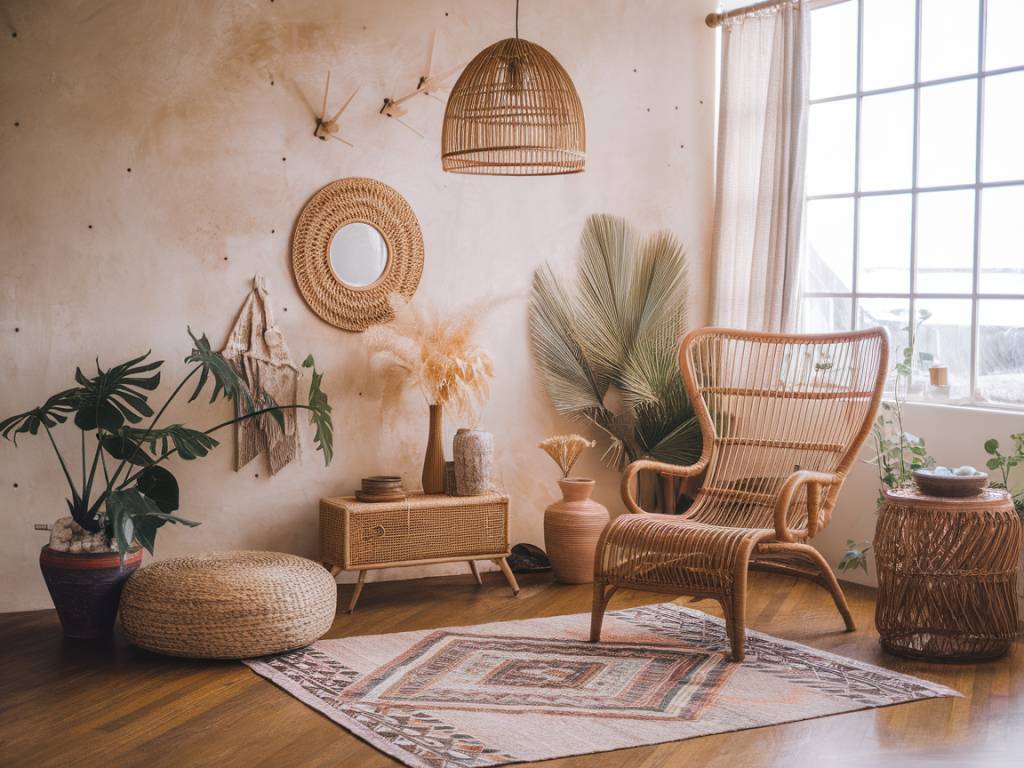There’s a certain charm and nostalgia that surrounds rattan and wicker furnishings. Perhaps it’s the gentle creak of a wicker chair on a summer’s afternoon or the intricate patterns that showcase the craftsmanship of this natural material. Once a staple in the bohemian homes of the 70s, these materials are now seeing a renaissance, effortlessly weaving their way back into contemporary interiors.
The Allure of Rattan and Wicker
Rattan, with its robust yet flexible nature, and wicker, the technique of weaving rattan and similar materials, have been cherished for centuries. They bring an organic touch to home decor that is simply unmatched. But why, in a world teeming with glossy plastics and cold metals, are we finding our way back to these earthy materials?
The answer lies in our innate longing for warmth and authenticity. Just as Angela Lefèvre would remind her readers, our homes should be a reflection of our hearts—filled with pieces that resonate with our personal stories and aspirations. Rattan and wicker do just that. They connect us to the past, while simultaneously paving the way for a sustainable future.
Incorporating Rattan and Wicker in Your Home
Whether you’re a seasoned decor aficionado or just beginning to explore, incorporating rattan and wicker can be both simple and rewarding. Imagine curling up with a book in a handwoven rattan chair, or hosting dinner parties with friends around a striking wicker table. It’s about creating a space that invites relaxation and conversation.
Want a few ideas?
- Accent Chairs: Add a touch of elegance to any room with a rattan or wicker accent chair. Perfect for creating that cozy reading nook in the corner of your living room.
- Baskets and Storage: Keep clutter at bay with wicker storage solutions. They’re as pretty as they are practical, offering a textured approach to organization.
- Light Fixtures: Brighten up your spaces with hanging rattan pendant lights, bringing a boho-chic vibe that compliments both modern and rustic interiors.
The Science Behind the Craft
Let’s delve into a small science lesson, shall we? Rattan is a type of vine that grows in the forests of Southeast Asia. It’s known for its strength and ability to grow in diverse conditions. This makes it a popular choice for sustainable furniture production. Unlike hardwood trees, rattan grows much quicker, making its environmental footprint significantly lighter.
Meanwhile, the art of weaving wicker is a skill passed through generations. The tactile process of weaving rattan into intricate designs requires patience and precision, each piece telling its own unique story. In embracing these materials, we’re also supporting artisanal craftsmanship—a testament to the beauty of handmade design.
Why Now? A Cultural Resurgence
So why are rattan and wicker making a grand comeback now? In part, it’s a cultural shift. Consumers are increasingly valuing sustainability, craftsmanship, and unique pieces over mass-produced uniformity. Rattan and wicker fit this narrative perfectly, blending style and eco-consciousness. They’re versatile, too—lending themselves to a myriad of styles from coastal to Scandinavian, bohemian to minimalist.
Imagine entering a space adorned with these materials—a woven rug beneath your feet, the tactile sensation of a wicker bench, all set against a backdrop of lush greenery. It’s as though a breath of fresh air has swept through, connecting us back to nature and the peace it affords.
Busting Myths: Durability and Maintenance
There’s a common misconception that rattan and wicker are delicate and high maintenance. While they require some care, they’re far more resilient than many assume. Regular dusting and occasional vacuuming can keep them looking pristine. For outdoor pieces, a simple coat of furniture varnish can work wonders to shield them from the elements.
Moreover, if you’re worried about the occasional scratch or scuff, think of them as adding character. Much like lines on a page or wrinkles on a face, they narrate the life lived around them.
A Piece of the Heart
As we navigate through trends and fads, the lasting appeal of rattan and wicker lies in their heart. These materials echo a philosophy that our homes should be more than just visually appealing; they should be sanctuaries of warmth, love, and memories.
Stepping back into our daily lives, it’s worth contemplating: What stories do we want our homes to tell? Can a woven basket or a rustic chair whisper tales of adventure and sanctuary? With rattan and wicker, perhaps it can. As Angela Lefèvre often muses, the heart of the home isn’t found in what can be displayed, but in what can be felt—a sentiment as enduring as the timeless weave of wicker itself.



